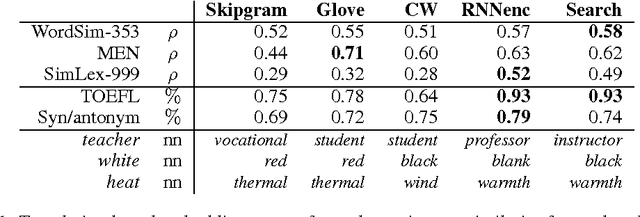Not All Neural Embeddings are Born Equal
Paper and Code
Nov 13, 2014


Neural language models learn word representations that capture rich linguistic and conceptual information. Here we investigate the embeddings learned by neural machine translation models. We show that translation-based embeddings outperform those learned by cutting-edge monolingual models at single-language tasks requiring knowledge of conceptual similarity and/or syntactic role. The findings suggest that, while monolingual models learn information about how concepts are related, neural-translation models better capture their true ontological status.
* 4 pages plus 1 page of references
 Add to Chrome
Add to Chrome Add to Firefox
Add to Firefox Add to Edge
Add to Edge